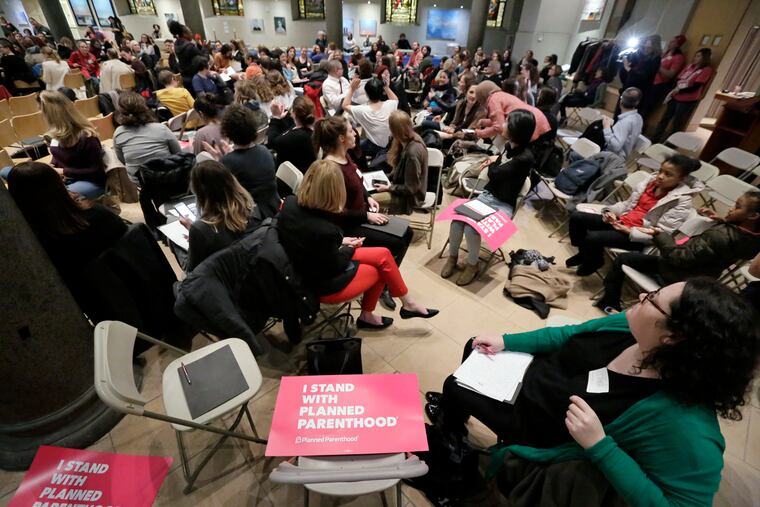As Roe v. Wade anniversary approaches, reproductive rights continue to be challenged | Opinion
As we mark the 47th anniversary of the Roe v. Wade decision on January 22nd, we are facing a critically important juncture in the fight to protect sexual and reproductive health and rights.

As we mark the 47th anniversary of the Roe v. Wade decision on Jan. 22, we are facing a critically important juncture in the fight to protect sexual and reproductive health and rights. As we look back on the escalation of attacks on abortion rights in 2019, we recognize that the promise of Roe v. Wade has never been fully realized by all. Unabated neglect of the health and rights of marginalized communities has continued to place access to reproductive health care out of reach for many. Looking ahead, we must diligently work to ensure the right to abortion.
In 2019, we saw state legislatures enact 26 bans on abortion. Encouraged by the conservative tilt of the Supreme Court, many of the bans have the goal of bringing a direct challenge to Roe v. Wade. These bans have nothing to do with advancing public health and everything to do with a hateful political agenda. Earlier this month, a group of 200 members of Congress, including eight from Pennsylvania, sent a brief to the Supreme Court urging them to overturn Roe v. Wade. While support for abortion rights across the country is at its highest and growing, the fate of these rights is at its most tenuous since Roe v. Wade was decided.
Pennsylvania already has restrictive abortion laws, yet we have seen an onslaught of pieces of legislation — four in this session alone — designed to further curtail abortion access. Elected officials pushing anti-abortion legislation have shamelessly used those who have experienced miscarriage, individuals with disabilities, and grieving families as political fodder to achieve their ultimate goal of outlawing abortion.
We know who this legislation targets. Due to a long history of systemic inequities, abortion bans disproportionately threaten the health, rights, and lives of people of color, immigrants, people in the LGBTQ community, and lower-income individuals. People who depend on Medicaid for health care are barred from using their insurance for abortion care. Those struggling to make ends meet are faced with paying rent, child care, and putting food on the table. The additional burden of obtaining the funds to pay for an abortion, along with hurdles and barriers to care, often force unnecessary and harmful delays. When abortion bans are implemented, those with financial means will likely always have access to safe medical care, while others will suffer disproportionally from lack of options.
A growing majority of Americans support the right to abortion. Yet some politicians are focused on anti-abortion policy that would put people’s lives at risk when it is within their power to pass policies to improve health outcomes. Clearly, if these elected leaders cared about lowering the abortion rate, they would focus on measures that have proven to be the front-line defense in reducing the need for abortion: increasing access to affordable birth control and funding comprehensive sex education in our schools. In fact, these measures are responsible for the current all-time lows in the rates of abortion. Instead, we see some legislators working to the contrary by supporting regulations like the administration’s unethical “gag rule” on Title X funding, limiting the reach of the nation’s family planning program for those who are uninsured and underinsured. The hypocrisy of those who are committed to dismantling access to preventive health care does not go unnoticed.
While the importance of the right to abortion cannot be overstated, Planned Parenthood commits to fighting an array of injustices that prevent our patients from exercising full agency over their lives and futures. We must strive not only to protect the freedoms guaranteed under Roe v. Wade, but to also ensure access to health care for all. The threat to the health of our most vulnerable communities is the greatest public health crisis of our time. There are vast and unacceptable health-outcome inequities by gender, race, income, and geography. Reducing and someday eliminating those inequities is our north star.
Our doors remain open. Every day, our patients come to Planned Parenthood for a full range of sexual and reproductive health-care services. In 2020, our commitment to our communities remains steadfast and strong.
For 103 years, Planned Parenthood has stood up to defend and fight for the people we serve. We will work to safeguard protections and continue to fight back against unjust laws and regulations, and we will work in coalition with our communities for a future that values equality, the freedom to control our own lives, and the ability for individuals to pursue and fulfill their own aspirational goals.
Dayle Steinberg is the president and CEO of Planned Parenthood Southeastern Pennsylvania.